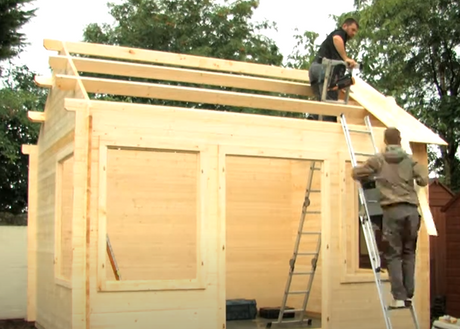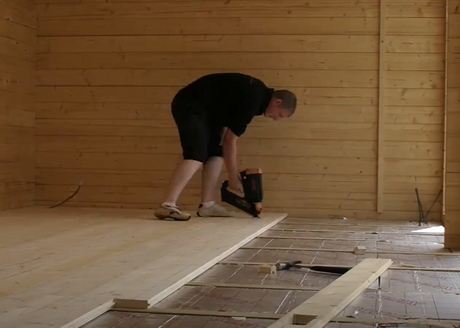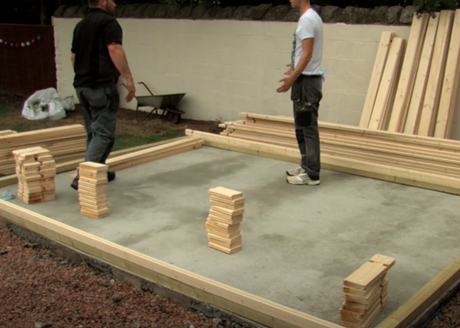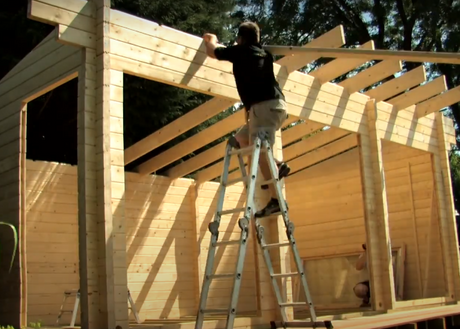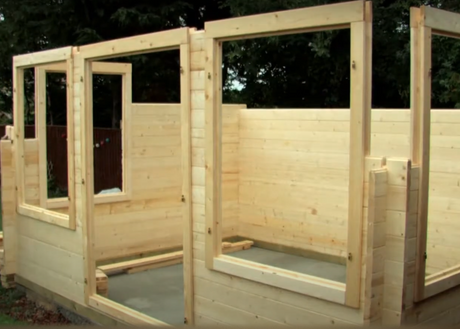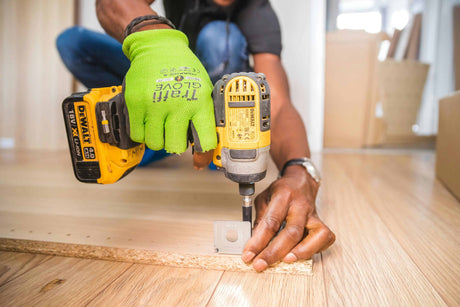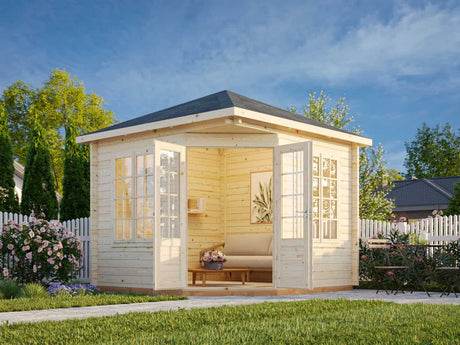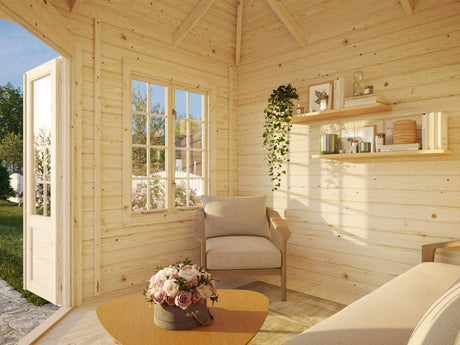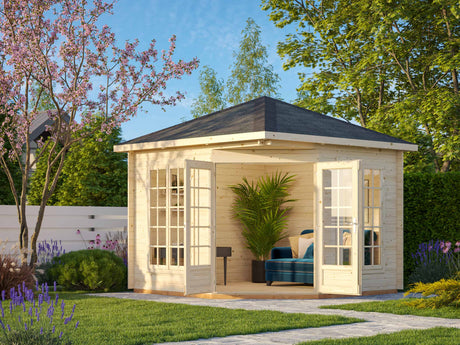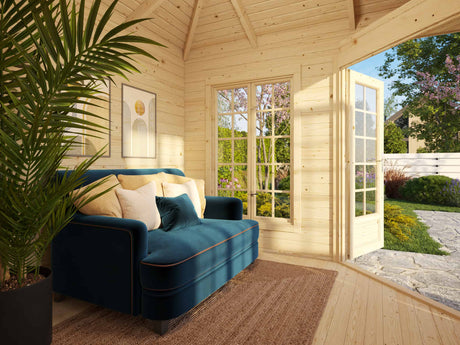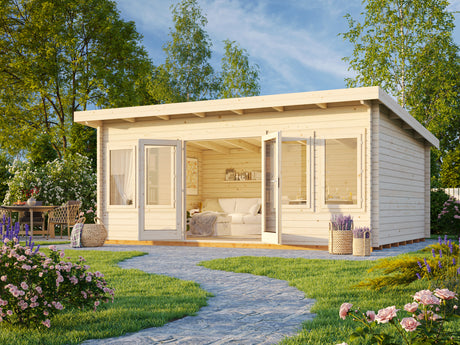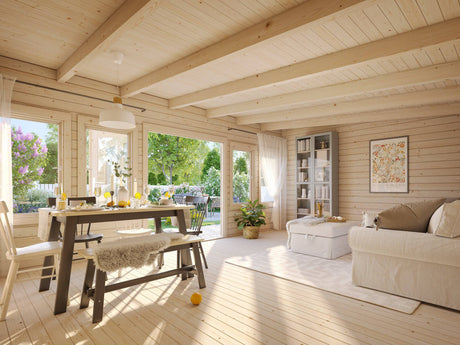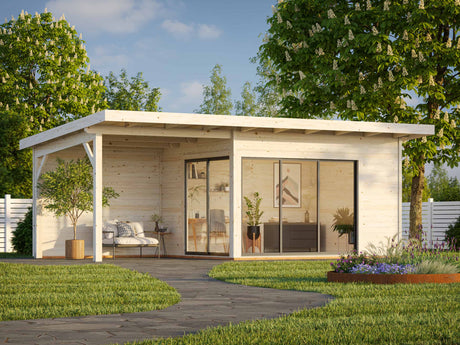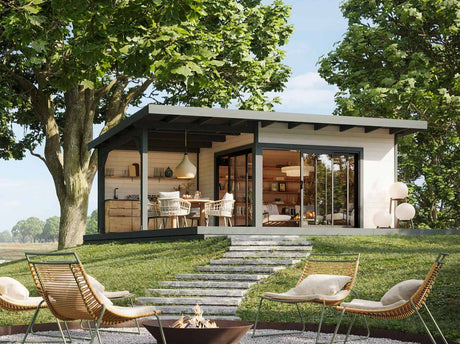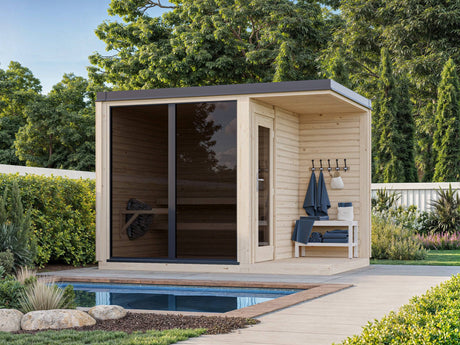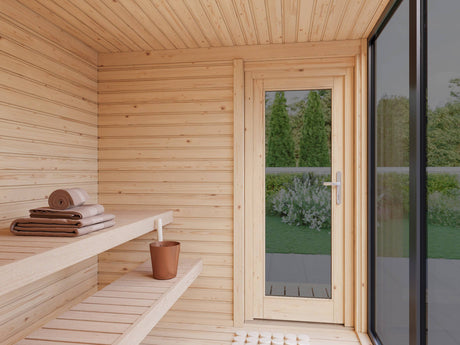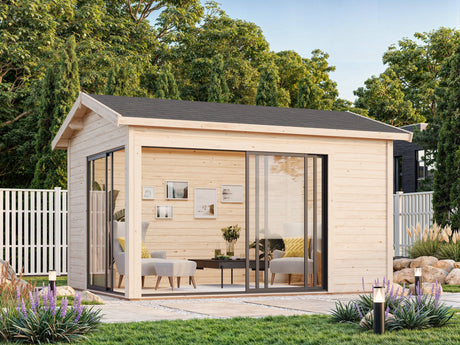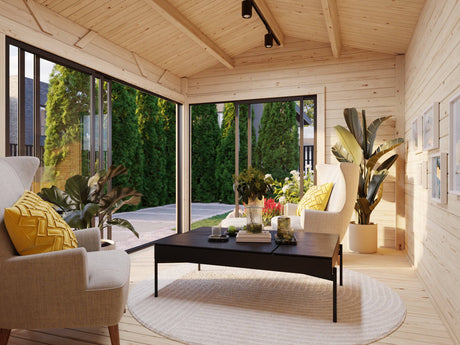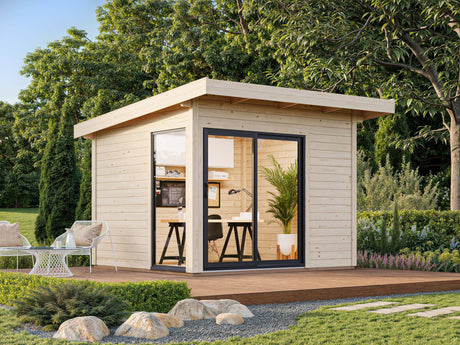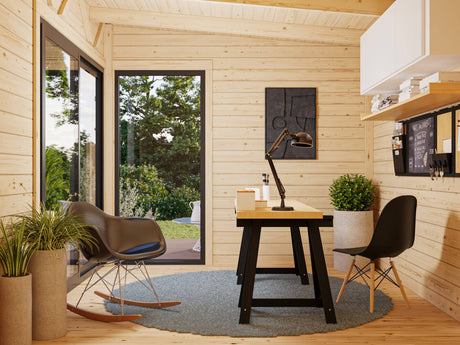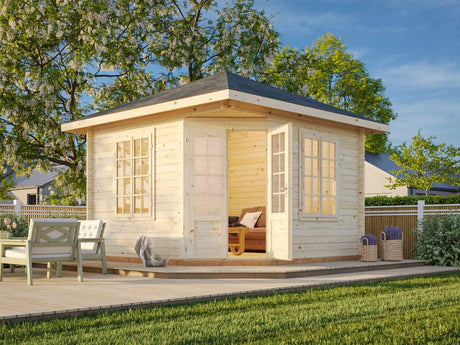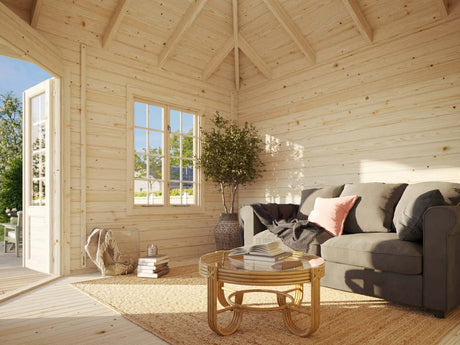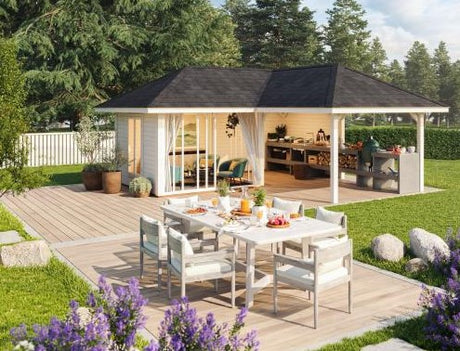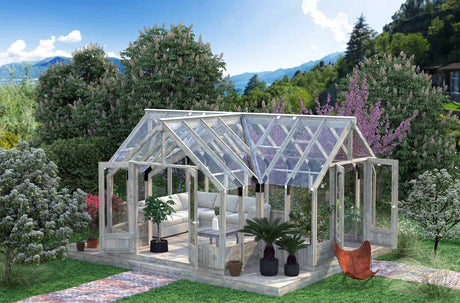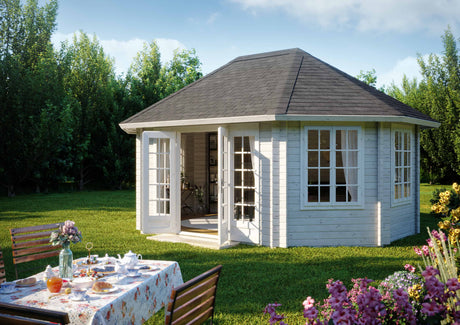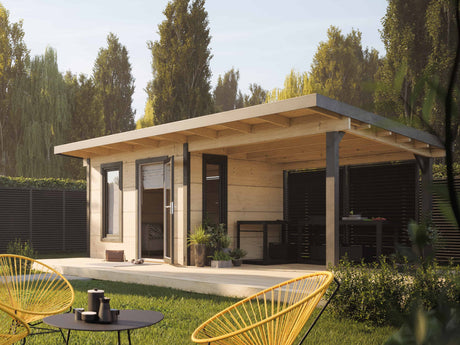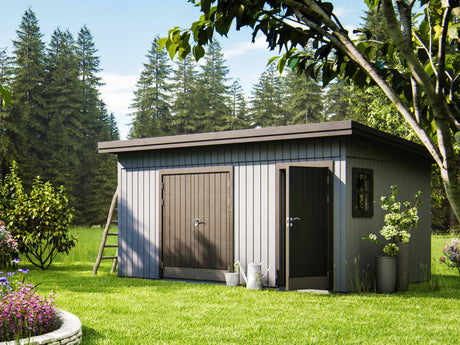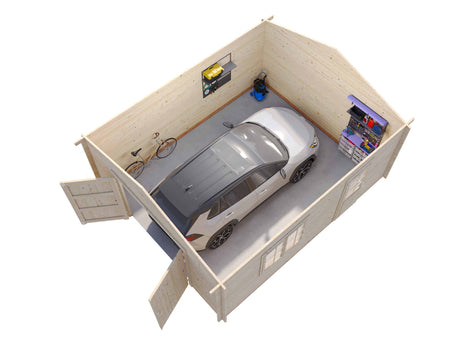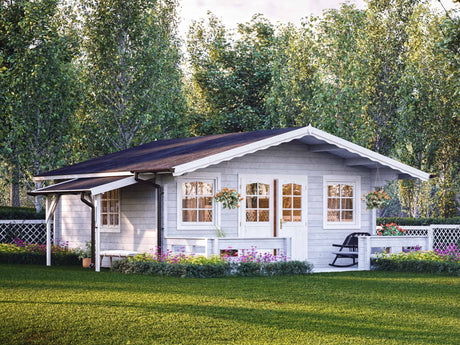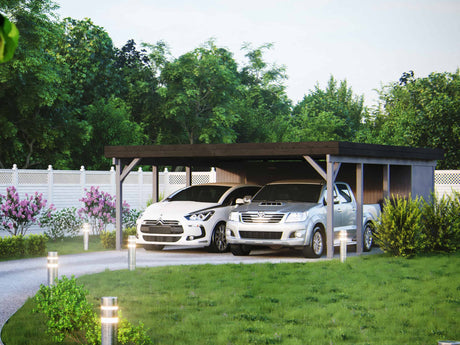Garden rooms have become increasingly popular as versatile outdoor structures that offer extra space for various purposes, from home offices to garden bars. But one common question here in the UK is: Can you sleep in a garden room? The answer largely depends on the design and intended use of the space.
Join us as we explore the key factors to consider when planning a garden room bedroom.
What is a garden room?
A garden room is a standalone structure built in a garden, separate from the original house. Unlike sheds or summerhouses, modern garden rooms are well-insulated and designed for year-round use. They can serve as home offices, studios, gyms, guest accommodations, or even holiday rental spaces.
Some garden rooms are prefabricated and delivered ready to install, while others are custom-built to suit specific needs. The materials used, permitted development rights, and available utilities determine whether a garden room can be a living space or even a spare bedroom.
Is it legal to sleep in a garden room in the UK?
Before converting a garden room into a sleeping area, it is important to check with your local planning authority and building control officer. The key factors you need to take into consideration are:
Planning permissions
Here in Britain, garden buildings don’t require formal planning permission if they fall within permitted development rights. These rights allow certain structures, such as garden rooms, to be built and adapted without a planning application, provided that building regulations are adhered to.
A structure intended as a permanent bedroom or guest bedroom may be classified as a habitable dwelling. This will require you to check permissions with the local planning office if you live in a restricted area, or conservancy area.
Generally, a garden room does not need planning permission if it meets the following criteria:
- A single-story structure with a height of less than 2.5m.
- It does not cover more than 50% of your land.
- It is not separated from the main house by walls and is classified as self-contained accommodation.
However, regulations within the UK may differ from country to country, so always check with your local authorities to see if planning permission is required.
Building regulations
If a garden room serves as a permanent secondary dwelling, you will require a toilet to be installed, and this will need to be done according to specific building regulations. Approved Document G will guide you on the proper installation of a bathroom.
This will also be true for insulation, ventilation, and electrical installations, which should meet building standards. Your local council can help answer any questions you have regarding your outdoor sleeping space.
If it is used for occasional sleeping quarters, you will generally not need formal planning permission. However, safety requirements should always be a consideration in any space where people will be sleeping, such as safe electrical work and fire safety requirements (Approved Document B).
Create a comfortable sleeping area
The comfort and safety of your guests are the primary concerns when planning sleeping accommodations. You must ensure your garden room meets the minimum requirements for insulation and heating to maintain a comfortable temperature throughout the year.
Insulation
Proper insulation will create a guest room or extra bedroom that is both functional and comfortable. Key areas to insulate include:
- Walls: Use high-quality insulation panels or insulated plasterboards to help retain heat.
- Roof: Whether you prefer a flat roof or pa ent roof, insulation against heat loss and rain is a must.
- Floor: Insulate the floor with rigid foam boards or underfloor insulation to keep moisture and cold out.
- Windows and doors: Double-glazed windows and well-sealed doors improve thermal efficiency.
If you’re in the market for a garden room as a bedroom, Palmako UK prefabricated cabins come with a number of these elements, saving you money and time. The 44mm logs combined with double-glazed doors and windows, sealed glass, and treated foundation beams will provide a guest-ready bedroom faster than if you did this all yourself.
Ventilation
Good ventilation is a non-negotiable for sleeping areas to prevent dampness, condensation, and stale air. Consider installing these solutions to encourage airflow and help your guests feel more comfortable.
- Ensure that you have a number of windows and/or sliding doors to allow fresh air to enter the room.
- Install extractor fans for reducing moisture (especially important in a garden room with a bathroom) in the sleeping quarters.
- Control humidity levels in colder months with a dehumidifier.
Palmako Melanie - 11.0m2
This garden room serves as a guest bedroom with a sofa bed. The double-opening windows and glazed double doors serve as a source of fresh air and natural lighting - an ideal combination for a guest bedroom.
Electricity and lighting
A functional sleeping space such as the one shown above requires proper electrical installation for guests to charge electronic appliances and boil a kettle (if provided). Important elements to consider are:
- A safe electrical connection from the main house to the garden room
- A number of power sockets, lighting, and possibly modern USB ports make it more convenient for your guests.
- Energy-efficient LED lighting or smart bulbs that can provide adequate illumination without high electricity usage.
- Solar panels with battery storage for off-grid garden rooms
Water supply and bathroom facilities
If you plan to use the garden room as a permanent bedroom or rental property, this changes the game considerably. Unless you have a separate outdoor bathroom facility close to the bedroom, it’s highly likely you will need to install one for your guests.
Further reading: Do I Need Planning Permission For A Garden Room With A Toilet?
Security considerations
For your peace of mind and that of your guests, adequate security is a must for a garden room away from the main property. Important safety measures include strong locks on doors and windows, a wireless alarm, motion sensor outdoor lighting, and even security cameras if the budget allows.
Interior design and privacy

If the primary purpose of your garden room is to have an additional bedroom then your focus should be to make it as comfortable and inviting as possible for your guests. If your guest bedroom will be close to the neighbours property, you will need to consider additional privacy elements (both for your guests and your neighbors).
To make a garden room cosy, private, and welcoming, consider:
- Opting for high-positioned or frosted windows on the side facing the neighbours.
- Install skylights to bring in natural light without compromising privacy and security.
- Use one-way privacy glass or window films that allow you to see out but block views in.
- Use of blackout blinds or Roman shades.
- Use of top-down, bottom-up blinds, which allows your guests to adjust coverage while allowing light in.
- Use trellises with climbing plants to shield the garden room and maintain privacy.
- If you are concerned about sound transmission, install decorative acoustic panels, soft furnishings, and thick carpets.
- For a high-tech alternative, use smart privacy glass, which turns opaque at the press of a button).
Adding these privacy features will also show your goodwill towards the neighbors if your garden room is close to a boundary line, which may help your case if you do need to get permission from your neighbors to erect an outdoor structure.
Conclusion: Can you sleep in a garden room?
The simple answer is: Yes, you can sleep in a garden room, but several factors must be considered when planning the sleeping area.
- Legal regulations and planning permission vary by location.
- Proper insulation, heating, ventilation, and electrical installations ensure safety and comfort.
- Security and plumbing may be necessary for full-time use.
- Privacy measures will need to be implemented if the structure is close to a neighbouring property.
If tackled responsibly, your garden room bedroom can be a great addition to your existing home and increase the value of your property. Before making any modifications, check local laws and invest in proper construction to ensure a safe sleeping space.
If you haven’t purchased a garden room yet, consider Palmako’s well-insulated and easily constructed Nordic spruce log cabins are an excellent option if you want a garden building that can easily comply with U.K regulations. Contact Palmako today and speak to an expert who can help you make a decision based on your current and future needs.




